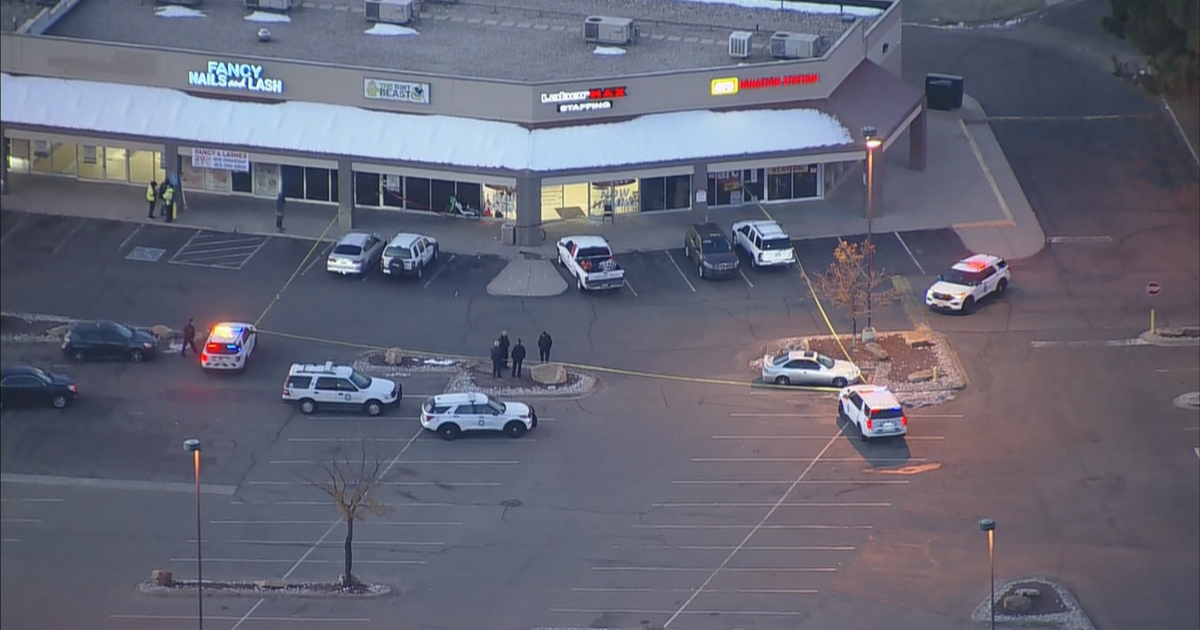Tent ignites during migrant camp relocation in Denver, mayor says situation "isn't sustainable"
A tent ignited in flames during the relocation of a migrant encampment on Wednesday morning. The City of Denver is opening two additional congregate shelter sites for the migrants gathered near Zuni Street and West 27th Avenue.
Denver fire crews rushed to the fire just before 9 a.m. and quickly extinguished the fire. The fire didn't spread to any other tents. What caused the fire is being investigated.
The downtown encampment has been growing for months. Piles of clothes, furniture and trash bags full of belongings line the tent-filled street. Buses and city services arrived on Wednesday morning to clear the area and transport migrants to one of two new congregate shelter sites.
"We have moved 400 people off the streets into housing, that is separate from the homeless initiative that we've been working on," said Denver Mayor Mike Johnston.
The goal is to connect migrants to housing or travel to preferred destinations.
The city is currently sheltering nearly 4,500 migrants. The addition of these two shelters will hold 320 more.
Johnston said that this situation with the large number of migrants arriving in Denver isn't sustainable.
"We need work authorization, we need federal support, and the last thing we need is a coordinated entry system," said Johnston. "Right now, Denver is the largest single recipient of migrants per capita of any city in America. We have two-and-a-half times more migrants than the next city per capita."
Johnston said the biggest hurdle is getting people authorized to work, "If every one of these individuals arrived in Denver with a work authorization the day they got here, they would need almost no federal support. They would be up and supporting themselves quickly. If they arrive and are here for three months or six months or two years, and can never work, we're going to need endless amounts of support to .... and it's not good for the fiscal health of the city."
Denver continues to remain a welcoming city for all migrants, but DHS says it doesn't have the resources to aid them forever. As of Jan. 2, the city has supported 35,834 migrants at a cost of more than $36 million.
The city says it's grateful for the funding it has received so far to support migrant sheltering operations, including a reimbursement award of $3.5 million from the State of Colorado. The U.S. Department of Homeland Security has advanced $1.6 million, and approved Denver for reimbursement of up to another $9 million in federal assistance.
RELATED: Venezuelan migrants save Denver girls in icy lake
Several of Colorado's Congressional members have joined U.S. Senators Michael Bennet and John Hickenlooper to urge the Federal Emergency Management Agency to increase its support for communities and nonprofits assisting migrants arriving in Colorado. Representatives Brittany Pettersen, Jason Crow, Joe Neguse, Diana DeGette and Yadira Caraveo are asking for FEMA to increase funding for its Shelter and Services Program, expand the program's eligibility to include more cities and nonprofit organizations, and provide technical assistance to communities setting up programs to support migrant arrivals – especially for communities in rural areas of Colorado.
Dear Administrator Criswell:
We write to you today to express our urgent concern and request immediate action to support migrants in Colorado through the Federal Emergency Management Agency's (FEMA's) Shelter and Services Program (SSP). In light of the recent influx of migrants across the State, there is a pressing need for expanded support. It is crucial that all affected communities are eligible to apply to every funding tranche should new funds be appropriated.
Colorado has experienced a significant influx of migrants in recent months, which is placing considerable strain on state and local government resources and nonprofit organizations. These partners are at the forefront of providing essential services to migrants and are in dire need of additional support. Buses bringing migrants into our state are now a daily occurrence, and we are seeing a growing trend of migrants initially arriving in Denver and then moving into other communities across Colorado.
These surges have been especially challenging in Denver, with a total of 32,351 immigrants arriving in the city to date as of this week. Texas Governor Greg Abbott has bused over 8,900 immigrants to Denver in the past seven months alone, exceeding the numbers sent to Los Angeles and Philadelphia combined. This influx has dramatically increased the number of individuals in shelters, which now exceeds 3,100, including approximately 1,200 children. The city has expended more than $33 million in response to this humanitarian crisis and they expect that number to increase exponentially over the next year without additional support. Alongside Denver, other communities such as Aurora and Carbondale have also been significantly affected. Carbondale, a small rural community, has received approximately 125 migrants in recent months and, with the support of Colorado's Department of Local Affairs, plans to spend nearly $225,000 to establish new, temporary shelters for migrants just for the winter. Unfortunately, to this point, the cost of temporary housing, food, transportation, and other necessities has largely fallen on Colorado taxpayers.
Once they arrive, migrants turn to local communities and nonprofits in search of refuge and assistance. However, the capacity of these organizations to provide adequate support is stretched thin. Nonprofits across Colorado, as well as state and local leaders, are concerned and seeking financial assistance and resources to meet the growing needs of these individuals.
In response to this critical situation, we strongly urge FEMA to:
- Increase the funding allocated to the SSP in the fiscal year 2024. This increase is vital to adequately support the existing and emerging needs of migrants in Colorado.
- Broaden the eligibility criteria for SSP funding. We request that eligibility be extended to additional cities and nonprofit organizations not previously funded in the 2023 cycle. This expansion is crucial in ensuring that all affected communities and organizations can access the necessary resources to support migrants effectively.
- Provide technical assistance to communities setting up programs to meet the needs of migrants. The need for additional expertise is particularly acute in rural areas of Colorado, where small, capacity-limited local governments are seeking to establish these programs for the first time.
The situation in Colorado reflects a broader national challenge. As such, it is imperative that FEMA responds proactively to ensure that all communities facing similar crises have the opportunity to apply for and receive adequate support, should new funds be appropriated.
Your prompt attention to this matter is not just a response to a pressing need; it is essential to ensuring thousands of new arrivals facing harsh and unpredictable conditions have shelter and support throughout winter. We appreciate your consideration of this urgent request and stand ready to assist in any way to facilitate a swift and positive response.
Thank you for your attention to this critical issue.






